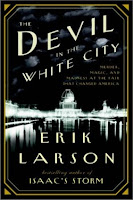The year began with Woolf in Winter and a personal victory. After three failed attempts, spaced over 25 years, I finally finished Mrs. Dalloway - and loved it! But instead of continuing To The Lighthouse with the rest of the group, I chose to reread The Hours by Michael Cunningham. Perhaps I will return to Woolf, and To The Lighthouse, this winter.
Next, I joined my first read-along. Jill from Fizzy Thoughts lead us through Wuthering Heights, which was far from the love story I was expecting. The book proved to be just okay, but the read-along group was the best - definitely a highlight of my year!
An unplanned French fixation developed around the same time. It began in March with Julia Child's My Life in France, continued through Emile Zola's The Ladies' Paradise (read for The Classics Circuit), and culminated with Paris in July. I read short stories by Guy de Maupassant and Zola, and Cheri and The Last of Cheri by Colette. Finally, there was Frances' group read of Madame Bovary by Gustave Flaubert and Lydia Davis' gorgeous new translation. I'm not finished with the French... there will be more Zola and Colette in the near future. Davis' translation skills even have me considering Proust.
Completing Bleak House was the biggest accomplishment of the year. Although it started out as a read-along, I fell behind almost immediately and continued at my own pace. At 989 pages, this was my longest book of the year. It was a combination book/audio for me, and I learned that I especially enjoy listening to Dickens' novels.
Finally, on to my favorites...
FICTION:




Freedom by Jonathan Franzen
Cutting for Stone by Abraham Verghese
Madame Bovary by Gustave Flaubert, translated by Lydia Davis
The Group by Mary McCarthy
The Ladies' Paradise by Emile Zola
Doreen by Barbara Noble
NON-FICTION:
The Immortal Life of Henrietta Lacks by Rebecca Skloot
My Life in France by Julia Child
AUDIOBOOKS:
Let the Great World Spin by Colum McCann
Pavilion of Women by Pearl S. Buck
SHORT STORIES:
"A Lovely Time" by Dorothy Whipple
"A Doll's House" by Katharine Mansfield
"Good Neighbors" by Jonathan Franzen
"The Name of the Game" by Colm Toibin
"Why I Live at the P.O." by Eudora Welty
"Farewell" by Guy de Maupassant
And just for fun...
LITERARY PAIRINGS:
Mrs. Dalloway by Virginia Woolf
and
The Hours by Michael Cunningham
Summer by Edith Wharton
and
Ethan Frome by Edith Wharton
BOOKS I REALLY SHOULD HAVE REVIEWED IN 2010:
Mariana by Monica Dickens
Summer by Edith Wharton
Molly Fox's Birthday by Deirdre Madden
BOOKS FROM 2010 I STILL PLAN ON REVIEWING:
The Group by Mary McCarthy
Freedom by Jonathan Franzen
Pavilion of Women by Pearl S. Buck
And there it is, 2010 in review. Thank you all for reading this blog and sharing the ongoing book discussion. It's become an enjoyable part of my life, and I look forward to more book talk in 2011.












































